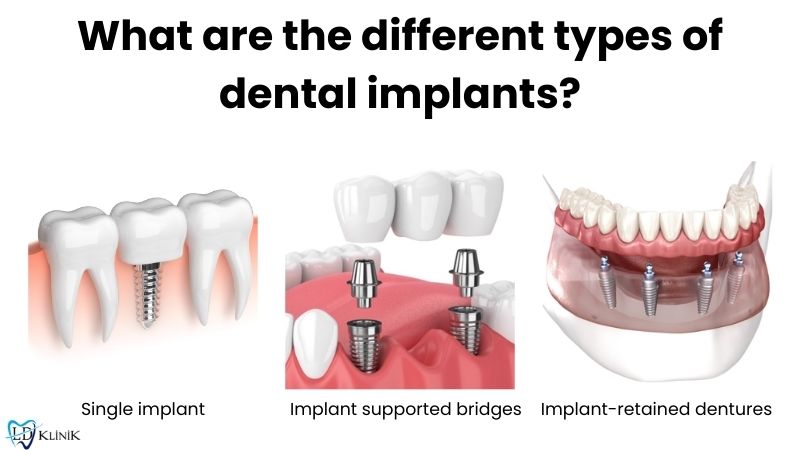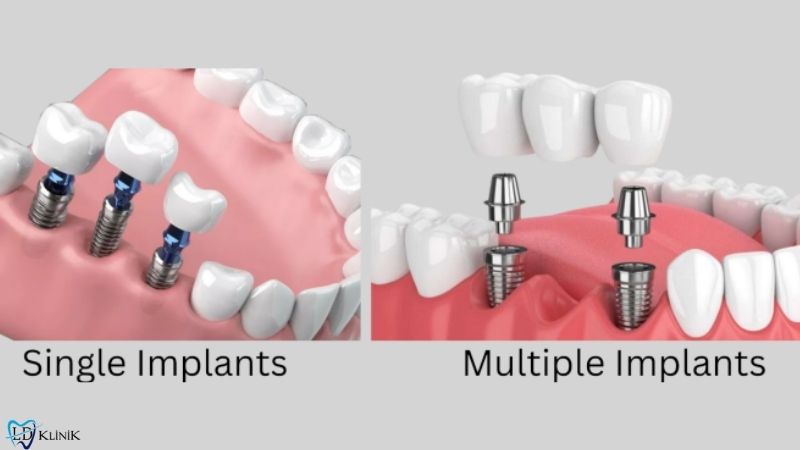A Comprehensive Solution for Tooth Replacement
A dental implant is an artificial tooth root, usually crafted from metals like titanium, that attaches artificial teeth to the underlying jawbone. It is surgically embedded into the jawbone to replace lost teeth and support restorations like crowns, bridges, or dentures. There are different types of dental implants, which will be explained in the next section. The following categories include common properties and procedures of these different types.

Implant Fixture: A screw-like structure inserted into the jawbone.
Abutment: A small connector that extends above the gum line and links the implant to the replacement tooth.
Crown: A custom-fabricated artificial tooth designed to resemble natural teeth.
After implant Antalya is surgically placed in the jawbone, it is waited for 3-6 months to fuse with the jawbone (osseointegration). After the healing is complete, the abutment and artificial tooth are attached.
Mimics natural teeth in terms of function and appearance.
It lasts for many years with adequate care.
Helps maintain jawbone density and facial contours.
Improves chewing ability and overall dental health.
Since gaining popularity in the late 1960s, dental implants have become a favoured alternative to removable dentures, offering a durable and aesthetically pleasing tooth replacement solution.
Dental implants offer a new approach to tooth replacement, restoring both function and aesthetics. Understanding the types of implants is important for making an informed decision. According to the restoration they support, implants are divided into 3 main categories.
Different types of implants Turkey fulfil unique needs ranging from single tooth replacement to comprehensive restoration, ultimately improving patients' quality of life. Furthermore, each implant type serves a purpose and is selected based on factors such as jawbone structure, oral health status and the patient's specific dental requirements.

Deciding between a single-tooth implant or implants for multiple teeth depends on your specific dental needs, how confident you want to feel about your smile, and the overall treatment process. Both options restore the natural look of your teeth and enhance your appearance.
It is designed to restore multiple missing teeth. It usually requires two or more implants to fix a bridge or prosthesis. It involves a more complex procedure with additional planning. Treatment time is longer due to the replacement of several teeth. Replacing multiple adjacent teeth is usually more cost-effective.
It can be more efficient as a single procedure can restore several teeth at the same time.
Supports bridges or prostheses without depending on nearby natural teeth.
Helps maintain jawbone density better than removable dentures. Provides greater stability and functionality, especially for bridges or dentures. It is more effective in preventing jawbone loss when replacing multiple teeth.
In conclusion, deciding between single and multiple dental implants is a personalised process, depending on factors such as the extent of tooth loss, oral health status and patient preferences. While both offer durable tooth replacement, the complexity, duration and effects on oral health differ significantly.
They are bridges permanently attached to implants. Cannot be removed by the patient. Usually requires more implants, typically 4-6 per arch. Provides improved stability and support. Offers a stronger bite and more durability. Provides more natural chewing and speech. Easier daily cleaning and maintenance for patients.
Generally more costly due to the number of implants and the complexity of the procedure. They are used for more than 15-20 years due to their fixed structure and solid support.
It is a fixed set of teeth attached to implants fixed to the jaw. The most commonly used types are All on 4 and All on 6. For All on 4 dental implants Antalya, 4 implants are placed in one jaw and for All on 6 dental implants, 6 implants are placed.
Implant supported bridges cannot be removed like other implant Turkey treatments. In this way, it provides strong stability and durability. It provides development in the jawbone and slows down the existing jawbone resorption. It provides a better speech and higher self-confidence. It is easier to clean and maintain. Patients can eat freely as it provides a better bite.
The least common type, these implants are intended for patients with significant upper jawbone loss. Instead of being inserted into the jawbone, they are secured in the cheekbone (zygomatic bone) to provide a stable foundation for prosthetic teeth.
All-on-4 and All-on-6 dental implant Antalya techniques simplify full-arch tooth replacement for individuals with complete tooth loss or near-complete loss, particularly those with compromised jawbone. By utilizing just four or six implants, strategically angled in the posterior, it provides a stable foundation for a complete set of replacement teeth, offering a less complex alternative to traditional methods.All-on-6 is ideal for those seeking a potentially more durable solution, as the extra implants may provide better long-term support.
These techniques address similar patient needs, including:
The decision between All-on-4 and All-on-6 will be based on jawbone health, bite force, and personalized patient assessments
Positioned above the jawbone but beneath the gum tissue, these implants consist of a metal framework that rests on the jawbone and supports artificial teeth. They are typically recommended for individuals with insufficient jawbone density to sustain endosteal implants.
The selection of a dental implant is a personal decision, with each type designed to address specific needs related to jawbone structure, oral health, and individual patient goals, based on accurate medical information.
Single-tooth implants are ideal for replacing individual missing teeth, offering a natural appearance and function while preserving nearby healthy teeth, though they tend to be more costly per implant. Multiple-tooth implants are a practical solution for restoring several missing teeth, often supporting bridges without affecting natural teeth and being more cost-effective, though treatment may take longer. Implant-supported bridges are permanently fixed, providing superior stability and bite strength but typically requiring more implants (4-6 per arch) and a higher investment due to their complexity. In contrast, implant-retained dentures are a more affordable, removable option that requires fewer implants (2-4) while still offering better stability than conventional dentures.
Selecting the right option depends on several factors, including:
For instance, a single-tooth implant is often ideal for someone missing one tooth with sufficient jawbone support. On the other hand, implant-supported dentures may be a better choice for a patient who has lost all teeth in one arch but has reduced jawbone density.
This blog post is written for informational purposes only. We recommend that you contact your dentist for treatment. Please contact us to get dental implant treatment in Turkey and to learn dental implant prices.